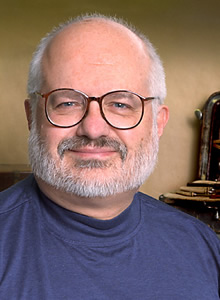
Strange to say, but it wasn’t until May 2012, when he spoke at a conference marking the twenty-fifth anniversary of Edwards v. Aguillard that the Stanford Constitutional Law Center and NCSE organized, that I met Ron Numbers in person for the first time. Without any ado, we quickly fell into a discussion of the latest developments at La Sierra University—a Seventh-Day Adventist university in Riverside, California, which was then undergoing a controversy about the teaching of evolution in its biology classes.
It seemed natural. To me, at least, it felt as if we were old campaigners. This wasn’t only because we had exchanged e-mails from time to time—memorably, about the former creationist superstar Dmitri A. Kouznetsov of the Russian Creation Science Fellowship. (Kouznetsov’s career imploded amid accusations of scholarly dishonesty in the mid-1990s; he then reinvented himself as a supposed expert on the Shroud of Turin; and when last spotted he was serving time for passing bad checks in Connecticut.)
Rather, my sense of familiarity with Numbers mainly came from my habitual immersion in his magnum opus, The Creationists (1992; expanded edition 2006). It’s hard to make it through the 450-odd pages of the book without coming away not only with a detailed account of the creationist movement but also with a strong impression of the author himself—as a historian with a complete mastery of his material, a relaxed but precise style, and a sympathetic, though not uncritical, attitude toward his subjects.
Numbers’s sympathy is not entirely surprising. He observed, “Born and reared in a fundamentalist Seventh-day Adventist family of ministers, I learned [George McCready] Price’s version of earth history at my parents’ knees.” It wasn’t until he attended a lecture on fossil forests that he accepted that the Earth was at least thirty thousand years old. “Having thus decided to follow science rather than Scripture on the subject of origins, I quickly, though not painlessly, slid down the proverbial slippery slope toward unbelief.”
“Although I no longer believe in creationism of any kind, I am strongly committed to treating its advocates with the same respect I might accord evolutionists,” Numbers added. A measure of his success in doing so is that among the praise for The Creationists was the following endorsement from the ICR’s Henry M. Morris: “For those interested in the background of the modern revival of creationism, whether evolutionists or creationists, this book is a rich mine of information and historical insights.”
The Creationists was not Numbers’s only contribution to the history of the antievolutionism, to be sure. Creation by Natural Law (1977), based on his dissertation, discussed the reception of Laplace’s nebular hypothesis about the origin of the solar system in the United States, and Darwinism Comes to America (1998) collected a number of his papers on the history of the reception of Darwin’s ideas in the United States, including, inevitably, creationism.
Also important are Numbers’s efforts to promote a clearer, historically informed, view of the complex relationships between science and religion, especially by way of a number of collections on science and religion that he edited or coedited, such as God and Nature (1986), When Science and Christianity Meet (2003), Galileo Goes to Jail and Other Myths about Science and Religion (2009), Biology and Ideology from Descartes to Dawkins (2010), and Science and Religion around the World (2010).
And Numbers’s influence on the scholars who have found insight and inspiration in his work ought not to be overlooked in assessing his importance. It’s rare to find a serious work in the history of antievolutionism published in the last thirty years that fails to acknowledge his scholarship or his assistance: small wonder that Edward J. Larson—whose Pulitzer-Prize-winning book on the Scopes trial grew in part from his study with Numbers—dedicated his Evolution’s Workshop (2002) to Numbers.
Once in a while, Numbers will depart from his usual role as objective historian to speak his mind on the teaching of evolution. In the wake of creationist efforts in Wisconsin in 2004, for example, he coauthored a commentary calling for legislation that would block the teaching of creationism, including “creation science” and “intelligent design,” in the state’s public schools. (Such legislation was introduced, as Assembly Bill 1143, in the Wisconsin State Assembly in 2006, but the bill eventually died.)
But it is for his scholarship on the history of creationism that NCSE decided to honor him with a Friend of Darwin award in 2015. To combat creationism effectively, it is necessary to understand it, and nobody has done more to contribute to a historical understanding of creationism. As Ann Reid wrote to Numbers, “although you have, of course, been a laudably objective historian, your work has been invaluable to NCSE in its efforts to defend the integrity of science education against creationist onslaughts.”

